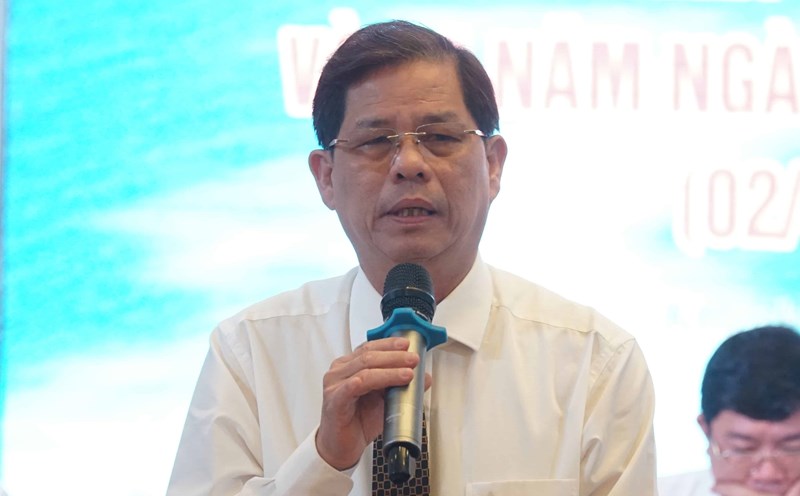From July 1, 2-level local governments will be operated nationwide. With the historical change approaching, localities are ready to operate the new model, with many efforts and expectations.
Reporters of Lao Dong Newspaper had an interview with Politburo member and Permanent Deputy Prime Minister Nguyen Hoa Binh to clarify the Government's vision, goals and solutions when implementing these important decisions.
PV: July 1 marks an important milestone in operating the 2-level local government model nationwide, including the provincial and commune levels. Can the Permanent Deputy Prime Minister tell us the core goal of this historic decision?
Permanent Deputy Prime Minister: The two-level local government model is an important policy of the Party, implemented by the Government and approved by the National Assembly.
Over the years, our apparatus has been promoting well and effectively, but so far it has revealed shortcomings due to new requirements.
First, the organizational structure is not really scientific, still cumbersome.
Second, there is still an intermediate layer.
Third, the number of staff is still large, so improving the salary regime is difficult.
Therefore, the Central Committee and the Politburo have decided to carry out an organizational revolution. Accordingly, local government is organized according to a 2-level model, eliminating the district level, leaving only the provincial and commune levels with a new scale.
Currently, the number of communes has decreased from more than 10,300 to 3,321.
The reorganization of local governments aims at specific goals.
First, it helps organize the local government apparatus more scientifically and concisely, eliminating intermediaries, making the government closer to the people and controlling the situation in the area more widely.
Second, this is also an opportunity to rearrange the staff, streamline positions that have not been able to promote their capacity effectively; at the same time, solve problems for old comrades who have health problems or have circumstances and wish to retire.
Thereby, helping to reduce the apparatus, while creating conditions to attract young resources, adding a team of quality, well-trained, and highly qualified staff.
Third, the merger also creates a large enough economic space to connect regions, promote the strengths of each region, and prepare for a period of strong development.
The merger creates outstanding economic spaces that can be compared to other countries in the region. For example, Ho Chi Minh City merging with Binh Duong and Ba Ria - Vung Tau will form an industrial and tourism center, along with the upcoming free trade zone, creating a strong and potential economic zone.
Reporter: Can the Permanent Deputy Prime Minister share about the work to be ready for the arrangement of provincial-level administrative units and the implementation of the 2-level local government model?
Permanent Deputy Prime Minister: Recently, the Politburo has established 19 working groups led by Politburo members and Secretariat members, directly going to localities to direct preparation work according to plan.
The focus of the working groups is to direct the preparation for the merger of administrative units. The preparation content includes reviewing the scope of administrative boundaries at the provincial and commune levels; determining new administrative centers; arranging personnel and preparing documents for the upcoming congress.
Every week, the Politburo listens to the preparation progress report and has decided to choose June 30 to simultaneously announce nationwide the decisions approved by the National Assembly at the 9th Session. These decisions include rearranging provincial and commune-level administrative units and perfecting key personnel.
Accordingly, Party and State leaders have been assigned to each locality to directly direct and organize this important national event.
Localities have been proactive and highly responsible in implementation, from the Party Committee to the government. The consultation of people was widely organized, the results showed that the two localities reached 100% consensus, the remaining localities were over 90%, of which the majority reached 98-99%. This shows the great consensus and support of the people for this policy.
Preparations for the launch of the new government apparatus have basically been completed, receiving consensus and creating an exciting atmosphere among the people.
Many localities and businesses have proposed organizing fireworks displays, considering this a historic milestone opening a new stage of development. The Vietnam Buddhist Sangha also agreed on the policy of ringing the bell on July 1, the official day of operation of the new government apparatus.
It can be affirmed that the atmosphere of the whole country is very excited about this important event. Many international leaders when meeting highly appreciated this as a strong, bold and wise decision of the Party and State of Vietnam. Some foreign leaders even commented that this was a decision that showed the spirit of the Vietnamese leadership.
Reporter: To arrange provincial-level administrative units and operate a two-level local government model, what specific solutions has the Government taken to ensure smooth operations, sir?
Permanent Deputy Prime Minister: The Government has reviewed the entire legal system. To date, 28 Decrees on decentralization and delegation of authority have been issued with more than 1,000 specific contents.
Accordingly, out of more than 600 tasks currently performed by the district level, over 90 tasks have been transferred to the province, the remaining more than 500 tasks are assigned to the commune level.
The Government also requires localities to review key projects, especially connecting infrastructure projects. For example, the National Assembly approved the Pleiku - Quy Nhon expressway project, contributing to narrowing the gap between Binh Dinh and Gia Lai, promoting the development of the Central Highlands.
Similarly, many other routes will continue to be started in the coming time. It is expected that on August 19, the Government will direct the simultaneous start of construction of 80 projects.
The merger of provinces aims to form a new economic space, but if there is a lack of connecting infrastructure, the goal will be difficult to achieve. Therefore, investing in infrastructure connectivity plays a key role.
In terms of economy, a connection has been formed from a national scale, connecting regions to within provinces. With synchronous preparation of infrastructure, major policies, human resources, administration and decentralization, it is forecasted that in the coming time, the economy will have more development momentum, the quality of service to the people will be improved.
For example, with a two-level government model, each commune must have a public administrative center for people to carry out administrative procedures. Most public administrative services have been digitized and deployed on digital platforms.
Recently, the Government assigned VNPT and Viettel to develop virtual assistants to provide public services on digital platforms. The test results in Ho Chi Minh City in the past 3 months showed positive results. Initially, there were about 10,000 visits per day, and it was expected to continue to increase sharply in the coming time.
Currently, the virtual assistant can answer about 1,800 questions related to public services. Online public services have not yet reached this number but will gradually expand in the future.
In the coming time, the virtual assistant will support answering questions and guiding procedures such as marriage registration, birth registration, death registration, vehicle registration, construction permit application, etc. Many services will allow people to sit at home to do it, saving time and effort.
In addition to better serving the people, digital transformation also aims to make the operation of the government public and transparent, creating conditions for people to monitor and limit harassment and negativity.
Sincerely thank the sharing of Permanent Deputy Prime Minister Nguyen Hoa Binh!











